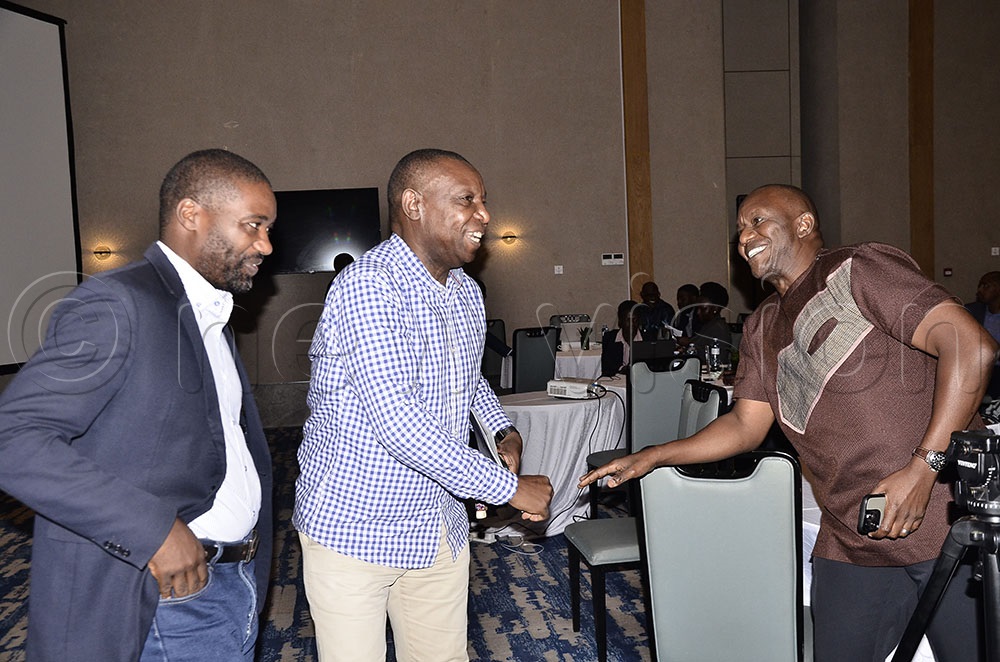Govt moves to scrap taxes on broadcast equipment to boost media access
Moses Watasa, commissioner of communications at the Ministry of ICT and National Guidance, said the ministry is already engaging the Ministry of Finance to review tax policies affecting broadcasters and digital communication tools.
The Commissioner for communication in the Ministry of ICT, Moses Watasa speaks during the annual general meeting of National Association of Broadcasters. (Photo by Ronnie Kijjambu)
__________________
The government has begun discussions on waiving taxes on key broadcast and digital transmission equipment in a move officials say will reduce the cost of media operations and expand digital access for Ugandans.
Moses Watasa, commissioner of communications at the Ministry of ICT and National Guidance, said the ministry is already engaging the Ministry of Finance to review tax policies affecting broadcasters and digital communication tools.
“The government of Uganda, through our ministry, is already engaging with the Ministry of Finance to look at tax policy issues and how they apply to transmission equipment, production cameras, studio equipment, but also other IT equipment like computers, tablets and smartphones,” Watasa said.
The deputy chairperson of National Association of Broadcasters (NAB), Ben Bwine (left) looks on as the Board of Trust for NAB, Aga Ssekalala (right) chat with the Commissioner for communication in the ministry of ICT, Moses Watasa during the annual general meeting. (Photo by Ronnie Kijjambu)
Watasa made the remarks at the National Association of Broadcasters Annual General Meeting held on November 21, 2025, at the Four Points by Sheraton Hotel in Kampala.
He noted that reducing the cost of smartphones is central to Uganda’s digital transformation goals, explaining that affordability will benefit young media owners and the wider public.
“We are talking about a digital trajectory that does not leave anyone behind. That is why we want to cut down the price of a basic smartphone to no more than sh100,000, and one of the ways is cutting taxes,” he said.
Watasa said the government remains committed to ensuring that broadcast equipment becomes affordable because of its importance in fostering and communicating development.
“Communication cannot be separated from the rapid inclusive development; we need it at all costs,” he said.
He explained that the push for tax waivers is part of a broader package the ICT ministry is negotiating to support media production, improve programming quality and strengthen digital infrastructure.
As part of this reform agenda, the government is also injecting additional resources into Uganda Broadcasting Corporation to improve its national signal capacity. Watasa said President Museveni has already directed a substantial increase in Uganda Broadcasting Corporation’s funding.
“The President offered sh30b each financial year. The one for this year is the one we are expecting,” he said.
“If you do it over three or four years, that takes you to about sh120b. That is good money to complete the overhauling,” he added.
Watasa revealed that the UBC board is currently assessing the status of transmission equipment across the country.
“We are aware that some stations are off air because UBC’s carrying capacity is compromised due to old or obsolete equipment. Once the board submits its report, we shall prioritise areas where equipment has to be replaced completely,” he said.
He added that the overhaul will focus on both transmission and studio production equipment to ensure UBC becomes stronger, more efficient and able to carry free-to-air broadcasters nationwide reliably.
Following the funding commitments and tax reform discussions, sector players said attention now needs to shift to strengthening the media industry.
Innocent Nahaabwe, a leader in the broadcasters’ association, said their priority is ensuring media houses operate under a fair and supportive tax regime.
“Our focus will be to ensure that members get a fair tax regime. We think there should be tax incentives,” he said.
He questioned why the hospitality industry enjoys tax exemptions while broadcasters, who carry information to the public, continue to face high operational costs.
“If the guys in hotels get tax-free beddings and all that, why shouldn't we in the media be able to get tax waivers on cameras, on equipment, on studio equipment and others?” Nahaabwe asked.

Some of the new office bearers of Rural Broadcasters Association (RUBA) and their board of trustees pose for group photograph after the Annual General Meeting of National Association of Broadcasters Association. (Photo by Ronnie Kijjambu)
On security personnel assaulting journalists, he said the association has been engaging security agencies to curb violence against the media ahead of the next elections.
“We have seen electoral violence against journalists over and over. We met all the security apparatus, and we are going to have more peaceful elections. So far, so good,” he said.
The association is also working with the Media Council on election coverage guidelines and negotiating with EPRS over artists’ royalty demands.
“We think they should continue to get the rates we agreed as media houses to pay. Taking a percentage of our gross revenue should not be possible,” he said.
Nahaabwe said broadcasters remain committed to engaging all stakeholders to ensure a sustainable media industry.
Susan Nsibirwa, the managing director of Nation Media Group, called for a better relationship between the media and security agencies during the election period.